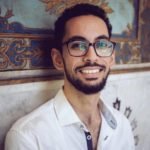Asad is a student at NYU, and discusses how his perception of identity has changed throughout his journey as an organizer, advocate, and a student. He explains how the obstacles he has faced have informed how he thinks about identity, and propelled him towards new perspectives and confidence as an intellectual. Asad is also a recipient of MALA’s Scholarship Program for 2018.
I am American by nationality, Pakistani by origin, and Muslim by religion. Coming from a working-class family where I didn’t have the luxury to explore complexities, I never thought too intensely about my identities until I learned that the world sees them as inherently contradictory. Could they possibly coexist at once or did I have to choose one over the other? Growing up, I studied classical Arabic and could read it fluently by 14, and by my late-teenage years I had committed nearly half of the Qur’an to memory, but rote memorization and the ‘banking system of knowledge’ left me jaded. It didn’t seem enough to merely ingest information without fully understanding its inner truth.
In 2011, I sought deeper meaning in life through charity. I co-founded a 501c3 non-profit organization called ‘Muslims Giving Back’ which originally aimed to deliver groceries to a few poor families but grew so rapidly that it branched out to feed the homeless, assist refugees, and partner with local social service groups to help underprivileged communities. My local mosque became my organizing center, and youth from all over the city would come to volunteer with us as we continually grew and expanded our work.
In 2012, things changed. One of our longtime volunteers confessed – on Facebook – to being an NYPD informant sent to spy on my organization, tearing my community apart. For my parents, it was a deeply traumatic moment that left a lasting impact. Their son was spied on for doing good work by the very people whose job it was to protect him. Some of my friends saw it as “too risky” to associate with me and my local mosque asked me to stop organizing. Perhaps my identities were in fact inherently contradictory. Perhaps they could not coexist.
In 2013, I joined the resistance. I partnered with the ACLU in a historic lawsuit challenging the NYPD’s surveillance of Muslim communities, delivering a fierce, high-pressured speech in front of One Police Plaza in downtown Manhattan on the day it was filed. This was my watershed moment, as it has since informed my life decisions in ways that no other incident has. I began to share my story at conferences, events, and with the media; I found my name mentioned in books and articles; I even endured smear campaigns from the NYPD’s lawyers. I was lucky, though, because an unparalleled network of attorneys, activists, and organizers supported me through it all. Today, after a longstanding struggle with the NYPD, we’ve reached a settlement that we believe will do justice to all sides and set a precedent to protect religious communities. All of this is a testament to the profound courage and resilience of my community.
In 2014, I received a transfer scholarship to New York University, taking me to new frontiers. For the first time in my life, I absorbed knowledge as a luxury as opposed to as a necessity for survival. As a social work major, I became a community organizer, dedicating my study to the advancement of social justice. At the same time, the culture shock of being in a large university full of affluent students who could share stories about their travels and interests made me feel alienated. I felt compelled to overcompensate. By spring 2015, I was a full-time student working two internships and one fellowship. Amidst it all, though I struggled, I also became aware of my intellectual promise. I have since then graduated and have now entered my first year of graduate school at New York University’s program in Near (Middle) Eastern Studies.
My experiences up until now have taught me that my identities and experiences may seem like paradoxes, but they allow me to seamlessly maneuver between multiple worlds. I am a practicing Muslim well-versed in traditional scripture but also a cosmopolitan social butterfly well-acquainted with pop culture; a student with an “education background” from the streets of a working class, conservative immigrant enclave in Brooklyn but also from the gilded halls of progressive New York University; an activist who has spoken truth to the world’s largest police force but who still stutters when giving class presentations. In my undergraduate supplemental essay for NYU, I wrote that “[t]he global village that we live in has inevitably connected us to one another and thus made the struggle toward alleviating the human condition a collective one . . . we can’t seek to end the suffering of others without first seeking to understand their experience.” This is my story and I want people to understand it.
I am pursuing a graduate degree because it would give me the academic backing to fully blossom into the advocate I need to be. I want to be more than just a ‘Muslim activist.’ I want to enter the ‘post-Muslim activist’ stage of my life, where I become an advocate for the inherent goodness of Islam itself. This is why I am a student in the Master of Arts program in Near Eastern Studies at NYU, and why I am applying for this scholarship, so that I can use my research and training to make my family, my community, and my people proud.


